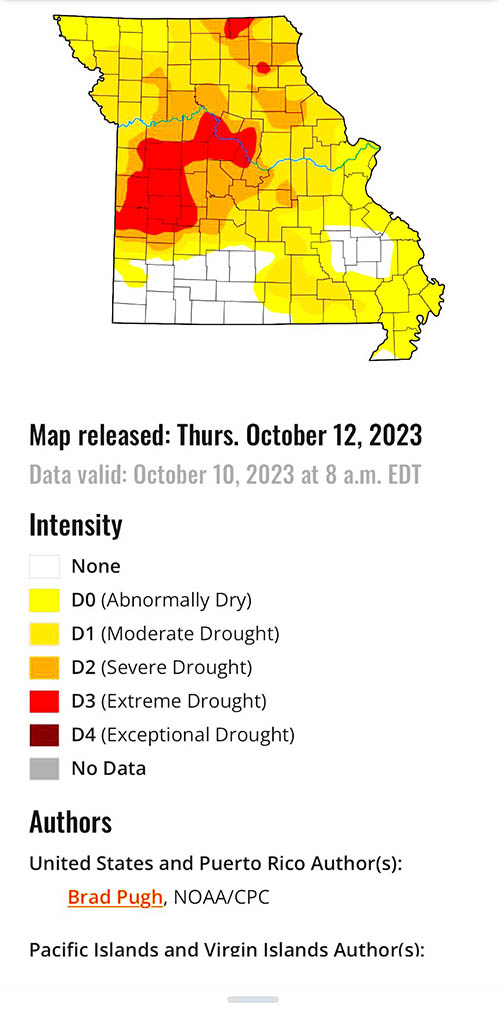Commentary: Drought persistence and assistance COLUMBIA – The summer of 2023 was one to remember for many farm families in Missouri. We’re accustomed to hot dry summers but my own father, who’s farmed “awhile,” says this is the worst he’s seen it since 1980. While I don’t recall the experience, he baled hay that November for a last-ditch effort to salvage forage where he could. He told me this summer that our farm ponds – which dried down to a muddy, barren mess – are worse than he’d ever seen. 
From mom’s perspective, she recalled butchering rabbits and chickens in the hot summer heat since it was hard enough just to keep them alive. This summer compares, with limited hay resources. Despite a few late summer rains, the struggle continues. This year, livestock producers ran out of grass well before they ran out of need. Fields normally harvested for hay offered a fraction of what we normally see. Any hay on-hand, or freshly harvested, was quickly consumed by hungry herds. In early October, the last grasp of summer was slow to let go but fall weather has finally arrived. The cold winds of winter will soon follow. As we turn our concerns to winter feeding, minus a normal hay crop, there are programs to help. As anyone in agriculture knows, programs of any kind won’t solve the struggles, but can hopefully be a stop gap to get through winter. By now, most farmers who qualify have met with their local USDA staff to enroll in the Livestock Forage Program. If not, please call your local service center as soon as possible to see if assistance is available in your county. This summer, the state Treasurer’s office rebranded the former Missouri First program into MOBUCK$. This farm relief loan program was expanded to offer assistance for farmers impacted by drought. More details about this program, which features an October 31 deadline, are available via the Missouri Treasurer’s website. The Internal Revenue Service reports eligible producers who were forced to sell livestock due to drought have an extended time period to replace some animals or defer tax on any gains from those forced sales. The relief generally applies to capital gains on livestock used for draft, dairy or breeding purposes. Livestock raised for slaughter, sporting purposes or poultry are not eligible. As part of the qualification, animals must have been sold solely due to drought, and your county must be designated as eligible for federal drought assistance. That’s the vast majority of the Show Me State, including my home county of St. Clair. Under the current extension, the animals must be replaced within a four-year period versus the typical two-year time span. If the drought persists, the IRS could extend that window. Further details are available through Publication 225 (Farmer’s Tax Guide) on the IRS website. Other programs made available this summer offered extended grazing options on public lands or access to public water sources. Given the state’s short forage supply, the Missouri Department of Agriculture has special over-width hauling permits available for moving hay. This is at no charge, but loads must be of legal height, length and weight. Those permits can be requested through the Missouri Department of Transportation at modot.org/mce. To ensure the fee is waived, hay haulers should place a comment in the application about the fee waiver. According to MODOT, the blanket permit fee of $96 and the single trip fee of $15 are waived for hay haulers through December 1. After giving up hope on a fall hay crop, I began the search for quality forage for late fall and winter. One resource is the Missouri Department of Agriculture’s hay directory. This year, I found another avenue, HitchPin.com, that serves as an online marketplace/exchange with added protections for buyers and sellers. Recently, a more seasoned farmer told me we’re one day closer to the end of the drought. That reminds me of the optimism that we all share as farmers and ranchers. It will be a long five months until spring, but hopefully these programs can help us weather the storm into the new year. |